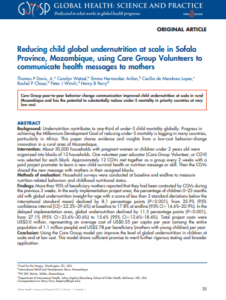ORGANIZATION
Academic Journal: Global Health Science And Practice
YEAR PUBLISHED
2013
DESCRIPTION
Progress in achieving the Millennium Development Goal of reducing under-5 mortality is lagging in many countries, particularly in Africa. This paper shares evidence and insights from a low-cost behavior-change innovation in a rural area of Mozambique. About 50,000 households with pregnant women or children under 2 years old were organized into blocks of 12 households. One volunteer peer educator (Care Group Volunteer, or CGV) was selected for each block. Approximately 12 CGVs met together as a group every 2 weeks with a paid project promoter to learn a new child-survival health or nutrition message or skill. Household surveys were conducted at baseline and end-line to measure nutrition-related behaviors and childhood nutritional status. More than 90% of beneficiary mothers reported that they had been contacted by CGVs during the previous 2 weeks. In the early implementation project area, the percentage of children 0–23 months old with global undernutrition declined by 8.1 percentage points from 25.9 to 17.8%. In the delayed implementation area, global undernutrition declined by 11.5 percentage points from 27.1% to 15.6%. Using the Care Group model can improve the level of global undernutrition in children at scale and at low cost. This model shows sufficient promise to merit further rigorous testing and broader application.

